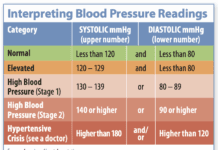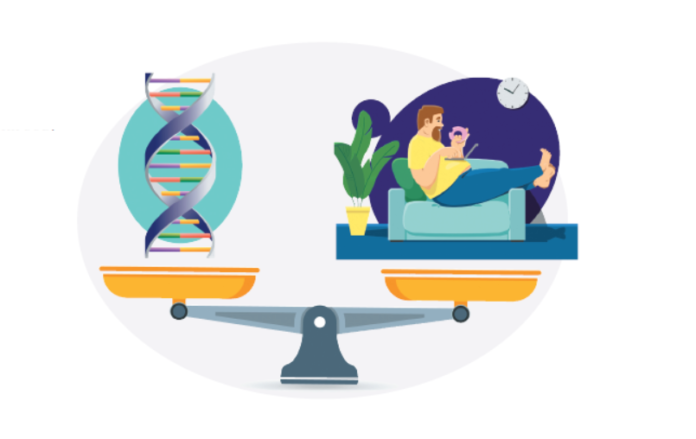In 1953, the same year Watson and Crick reported the discovery of DNA, Jean Mayer, former president of Tufts University and then a professor at Harvard School of Public Heath, published an article in which he predicted that a wide variety of genes are likely to contribute to the complex mechanisms involved in obesity. Since that time, researchers have identified hundreds of gene variants associated with body mass index (BMI), but we still cannot fully explain why some people become obese and others do not. Here’s what we do know:
Genes do influence weight. “Even before we knew about genes, there was the perception that weight or obesity could be inherited,” says José Ordovás, PhD, a professor at Tufts’ Friedman School of Nutrition Science and Policy and senior scientist and leader of the Nutrition and Genomics team at the Jean Mayer USDA Human Nutrition Research Center on Aging (HNRCA). “Gene variants that influence our weight can be associated with anything from appetite to behavior to metabolism.” Regulation of hunger; food cravings; the tendency to store body fat; capacity to burn calories and to use dietary fats as fuel; even the desire to be sedentary or to use eating as a way to cope with stress could all have genetic components.
“It’s important for people to realize that being overweight or obese is not entirely somebody’s fault,” says Ordovás. “They may have an ‘internal’ predisposition to gain weight. That said, genes are not destiny.”
Environment can trump genes. Many societies around the world are experiencing an “obesity epidemic.” Genes do not change quickly enough to account for this dramatic rise in obesity…so there must be other factors at play.
The obesity epidemic is seen primarily in environments where levels of physical activity are low and total calorie intake is high. But not all people living in these environments will become obese. Additionally, not all people with obesity will have the same body fat distribution or suffer the same health problems as their equally-overweight peers. These differences are a result of the interplay between genetics and environment:
Genes impact our response to environment. Someone who has a genetic tendency to store body fat, for example, or genes that trigger the manufacture of higher levels of hunger hormones, may gain more weight in an “obesogenic environment” than an individual without those traits.
Environment impacts the expression of our genes. While genetic changes take generations, epigenetic changes happen throughout our lives as a result of environmental factors. These changes frequently occur through DNA methylation, where molecules called methyl groups are attached to the DNA. Methylation can change the activity of a DNA segment even though the genetic sequence remains the same.
Numerous studies suggest epigenetic changes are associated with the tendency towards weight gain and the health impacts this excess weight has. One study that compared people who have never been obese with those who were obese but lost weight found significant methylation differences between the two groups on 248 genes.
Epigenetics is a relatively new field of study. While it offers exciting possibilities, we do not yet know whether obesity and obesity-related health outcomes are caused by, or cause, specific epigenetic changes. Importantly, most of this research has been conducted in Caucasian populations, which limits the application of results.
Although there are still many unknowns, it is clear that weight is determined by a complex interplay of genes and environment.
Many factors weigh in. “Based on current knowledge, I suspect that about half of weight is related to genes, and half to other factors,” says Ordovás. “Activity levels and the food environment are external influencers of weight, of course, and other mechanisms—like epigenetics and the microbiome—have emerged as important players.”
Diet: Numerous studies suggest healthy dietary choices may help overcome a genetic predisposition to obesity. A study published recently in the American Journal of Clinical Nutrition examined whether diet modifies the influence genes have on BMI. The study analyzed dietary intake of 30,904 participants. The researchers found that a higher diet quality was associated with lower connection between calculated genetic risk for weight gain and actual BMI. In other words, the influence of genes on weight appeared to be weakened by consuming a higher quality diet. (Higher diet quality was defined as higher intake of fruits, vegetables, whole grains, long-chain omega-3 fats, nuts, legumes, and polyunsaturated fatty acids, and lower intake of sugar-sweetened beverages, alcohol, red and processed meats, trans fat, and sodium.)
Physical activity: Regular physical activity has been associated with lower impact of genetic predisposition to obesity. A recent study calculated genetic risk scores for over 18,000 unrelated Han Chinese adults ages 30 to 70 years and compared those scores to reported physical activity and various measures of obesity. The study found that regular physical activity weakened the association between genes and obesity measures. The benefits of regular physical activity appeared to be even more impactful in subjects who had a higher genetic predisposition to obesity. The most significant effects of activity were seen in people who reported jogging regularly, but walking, dancing, mountain climbing, and long-term practice of yoga also attenuated genetic effects on BMI.
It is possible that diet and physical activity change the individual genetic risk for developing obesity through epigenetics. A recent systematic review of studies found evidence that resistance exercise programs induced epigenetic changes in pathways associated with energy metabolism and insulin sensitivity. Endurance exercise programs also caused changes in DNA methylation.
Microbiome: The human gastrointestinal tract is populated by approximately 100 trillion microorganisms. Studies suggest these microbes play a role in how calories from diet are used and may also influence the genes that regulate energy expenditure and storage. Specific alterations in the composition and function of the human gut microbiome have been observed in obese individuals.
The makeup of the gut microbiome is impacted by factors like age and antibiotic use, and also by diet, physical activity, and other lifestyle factors. Researchers are looking into whether manipulating the gut microbiota could help with weight loss or obesity prevention. Eating plenty of naturally high-fiber plant foods and probiotic-containing foods like yogurt with live cultures helps to nourish a healthy gut microbiome.

Your genes are not your destiny. Adjusting the environmental factors influencing our weight can help us overcome our genetic tendencies. “Research clearly shows that changes to ‘external’ factors, such as diet and physical activity, can compensate for unfavorable effects of obesity variants,” says Ordovás.
Science can’t choose a lifestyle plan to match your genes…yet. “Despite the technology and knowledge available to us today, we have only scratched the surface of understanding how genes contribute to body weight,” says Ordovás. In most cases, our understanding of the complex interactions between genes, environment, and weight are not yet at the point where genetic testing would be useful for guiding personal diet or physical activity plans. “We have been working on personalized or precision nutrition,” says Ordovás. “First, we need to understand the genetic, epigenetic, and microbiome predisposition for each individual. Then, based on the mechanisms involved, we could provide the right advice to overcome that predisposition. Can we do it today? Not entirely, but we are making good progress.”
There is plenty you can do. Lifestyle choices can help you take control of your genes. First, aim for a high-quality diet that emphasizes fruits, vegetables, whole grains, nuts, legumes, plant oils, fish/seafood, and probiotic yogurt and limits intake of sugar-sweetened beverages, alcohol, red and processed meats, and sodium. Second, move more.
“People with a genetic tendency to gain weight may need more willpower, more coaching, and soon more personalized advice, but obesity can be overcome,” says Ordovás. “The benefits will not only be cosmetic but also will contribute to healthy aging and a more active life.”
Try these tips to help counteract the impact of genes on weight:
- Remember, not all excess weight gain is due to genes; types and amounts of food eaten and level of physical activity have a big impact on weight—regardless of genetic make-up.
- Eat plenty of fruits, vegetables, whole grains, nuts, legumes, plant oils, fish/seafood, and probiotic yogurt and limit intake of refined grains, sugar-sweetened beverages, alcohol, red and processed meats, and sodium.
- Engage in physical activity on a regular basis.
- Don’t trust businesses trying to sell you personalized nutrition or weight loss advice based on genetic analysis. The science is not quite there yet.
























My doctor gave me the book “How Not To Die” by Michael Greger,M.D. plus the book called “The Plant Paradox” by Steven Guidry,M.D. I have a major problem with Celiac Disease. It took over 22 doctors and 15 years before I was diagnosed with this disease. I went through HELL. One of my daughters friend went through 29 Doctors . What the hell is wrong with the medical profession? My test was to be between 0 and 20. I was 289. My doctor wanted to know why I was alive? I know 3people that died and 6 that almost died from this disease. I have been telling people if you have a gut or brain issue check for Celiac. You would be surprise how many come back and tell me they got this disease!
1100 cal, .5 ozempic weekly. No weight loss. So frustrating. All my life this body thinks I need to be obese. I can’t lower calories any lower, not enough nutrients as it is.